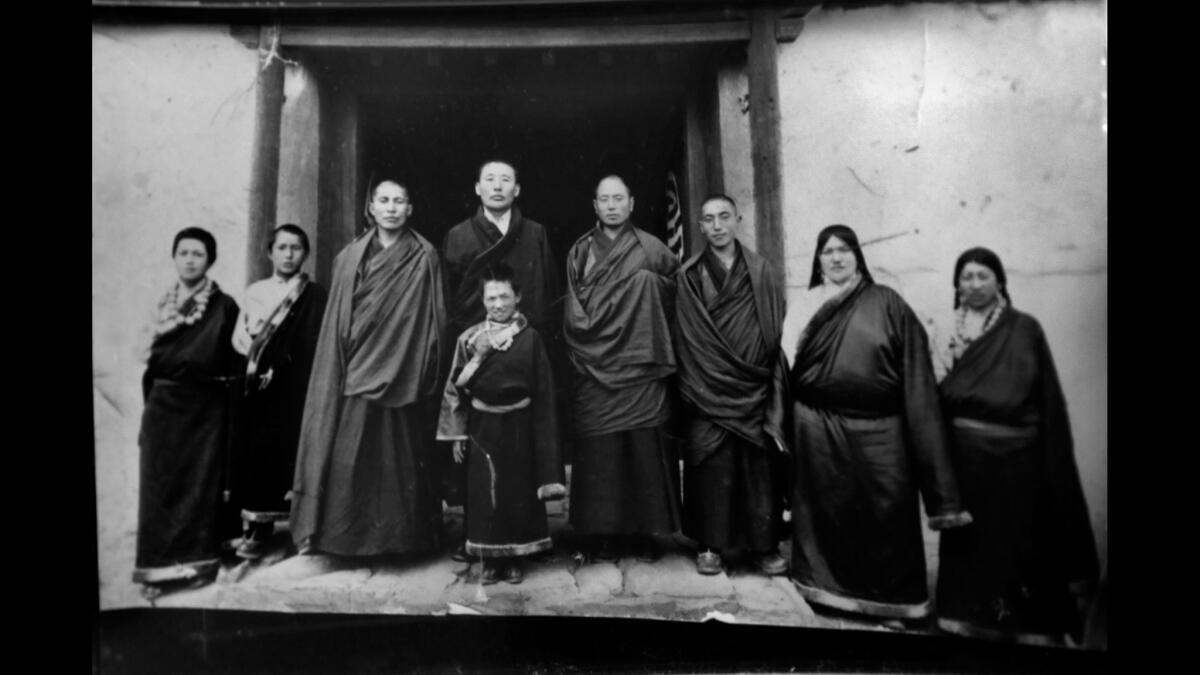Newsletter: Great Reads: Black norteño singers and ice cream wars
- Share via
Hey there. I'm Kari Howard, and I edit the Great Reads (a.k.a. Column Ones) for the Los Angeles Times.
Two of my biggest loves are narrative journalism and music, and I'm lucky that my days are filled with both: When reading the stories, I get inspired by songs I think fit the article's theme — a soundtrack.
Here are the Great Reads (and some lowercase great reads) of the past week, plus their soundtracks.
They could have been Aylan: Two little children on a train to Germany
With everyone's mind on little Aylan, the Syrian boy who drowned trying to reach Europe, Laura King made a moving choice in writing the story of migrants on a train to Germany: She focused on two children who could have been Aylan. Nine-year-old Ali and his little sister, Rafet, look out the windows in wonder as the fairy-tale town where Mozart was born flashes by. They play horse-and-rider in the aisles. Ali shuts Rafet inside a bathroom, and the carriage fills with piercing howls. Asked whether it is his first train ride, Ali is indignant, puffing out his chest like a miniature man of the world. "Of course not," he says. That had been the day before, from near Austria's border with Hungary. Such a lovely story.

Migrants arrive in Munich, Germany. (Christof Stache / AFP/Getty Images)
The soundtrack: "Land of Hope and Dreams," by Bruce Springsteen. This isn't the first time I've used this song as a soundtrack, and no doubt it won't be the last. But rarely will it fit a story better.
Grab your ticket and your suitcase
Thunder's rolling down the tracks
Don't know where you're goin'
Sky is turnin' black but you know you won't be back
Well darlin' if you're weary
Lay your head upon my chest
We'll take what we can carry
And we'll leave behind the rest
Big wheels rolling through fields
Where sunlight streams
Meet me in a land of hope and dreams
Straight Outta Compton, and singing in Spanish
He sings norteño songs as if they were written especially for the women swaying to the music in a San Bernardino nightclub filled with Latinos. He wears embroidered suits and can play the accordion. But one thing differentiates him from other singers of Mexican music: He's black. Or, as his manager likes to repeat, "El primer afro americano de la música mexicana." The first African American in Mexican music. Rhyan Lowery's transformation into El Compa Negro says something about the power of cultural proximity — and Los Angeles' changing demographics. Lowery was born in Compton in 1996, just a few years removed from the city's heyday as a birthplace of gangsta rap, the group N.W.A and its seminal album, "Straight Outta Compton." But the teen was baptized into a city that was fast becoming less black and more Latino. In this story, Brittny Mejia takes what could be a gimmicky idea and gives it California sweep: Latinos' growing numbers have shaped arts, food, music and culture throughout the state.
Rhyan Lowery, 19, a.ka. El Compa Negro, performs at Pepe's Night Club in San Bernardino. (Kent Nishimura / Los Angeles Times)
The soundtrack: "La Puerta Negra," by Los Tigres del Norte. Brittny says she grew up listening to this band. I didn't, but I loved this MTV Unplugged album from them.
The belltower full of bones: A Berkeley mystery
Some of my favorite Great Reads are the "who knew?" kind. And Amina Khan's article on 300,000 fossils stored inside the famous UC Berkeley belltower is a classic of the genre. As she writes: "Standing about 307 feet tall, the iconic Sather Tower — better known as the Campanile — defines UC Berkeley's skyline. Cal students crossing campus regularly hear it ring on the hour, with a live concert featuring the 61-bell carillon at noon. They may even take in the view of the Golden Gate Bridge from the observation deck, some 200 feet up. But very few have seen the trove of fossils that lies within — or know how on Earth they ended up there." If you want to know the answer, read this aptly named Great Read.
Paleontologist Robert Dundas holds an ancient tiger skull, part of the vast collection of La Brea Tar Pits artifacts stored in the UC Berkeley bell tower. (Don Bartletti / Los Angeles Times)
The soundtrack: "See These Bones," by Nada Surf. This is from the album "Lucky," which might be my second-favorite Nada Surf album ("Let Go" being the favorite). They don't get much attention for their lyrics, which is a real shame. Seemingly simple, actually existential — and wrapped in beautiful pop. One of my top 10 bands.
The Last Princess of Tibet — and her heartbreak
You may have seen "The Last Emperor," the gorgeous movie about the end of China's royalty. Well, Barbara Demick's story on a Tibetan woman who was born a princess should be a movie too. And of course it should be called "The Last Princess." The story is a one-woman window on the tortured history between China and Tibet. As a girl, she lived in an adobe castle on the edge of the Tibetan plateau with a reception room large enough to accommodate the thousand Buddhist monks who once paid tribute to her father. But then the Communists cracked down on Tibetans, and her life became one of tragedy. When she was a schoolgirl, she learned of her parents' deaths — one mysterious, one a suicide — from a classmate: "Your parents are no more." I love this paragraph: "When she finally agrees to a rare interview, she doesn't allow herself to cry. But her eyes remain moist as she tells her story, as though she lives in a perpetuity of grief."
Gonpo Tso, foreground, with her father, the king, Rapten Tinley, fourth from left, and others in Aba, China. (Carolyn Cole / Los Angeles Times)
The soundtrack: "Princess of China," by Coldplay and Rihanna. I don't know what it is about Coldplay. I should like them — I'm a sucker for pure pop, especially of the Brit variety. But except for "Yellow," they leave me cold. Still, this song seemed to fit the story.
What I'm reading online
A friend just told me about Epic magazine, one of the cool sites offering long-form journalism (with a great catchphrase: "As fun as fiction, but full of facts.") I clicked on the newest story, and laughed. If any of you have seen the absolutely wonderful Scottish movie "Comfort and Joy," you'll know why: It's about a war between rival ice cream trucks. Some examples of lines that made me extraordinarily happy: "Efrain didn’t see when the rest of the Keizer trikes rolled up beside Dennis’s Explorer, their speakers silent." "It was an unpredictable business, but Dennis was a natural. His fingers didn’t even burn when he handled the dry ice." And, finally, " 'There’s no room for hate in ice cream,'" Dennis liked to remind himself." My favorite long read in recent memory. (Oh, and the story has the best illustrations, including some perfect GIFs.)
What's on my bedside table
I'm a collector of vintage Penguin paperbacks, and although I prefer the simplicity of the plain orange-and-white, text-only covers, some of the illustrated ones are lovely. For example, "BUtterfield 8," by John O'Hara. With the lampposts of New York marching behind her, a young woman clutches her (stolen) mink to her chest. (This was long before Elizabeth Taylor created a more lasting image of the heroine in her pale silk slip.) O'Hara has such a wonderful, jazzy rhythm going in this novel, starting from the first sentence: "On this Sunday morning in May, this girl who later was to be the cause of a sensation in New York awoke much too early for her night before."
What's on my turntable
Although I spend most of my time listening with headphones to Spotify, sometimes I want to hear the needle touching down on vinyl. That's why I have a turntable in my office — and two at home (one inside, and a battery-powered one outside when the weather's fine — which it usually is in Southern California). This week's vinyl: "Nice 'N' Easy," by Frank Sinatra. On the cover, he is the picture of ease, leaning back in an upholstered chair with his hands behind his head. There's not much that's better than sitting outside on a warm summer evening, ice tinkling in a shaker, and listening to him sing the title song. (Any song that has the rhyme "the problem now of course is/to simply hold your horses" is a winner in my book.)
Want to chat? Have a great idea for a Great Read? I'm @karihow on Twitter and kari.howard@latimes.com on email
Sign up for Essential California
The most important California stories and recommendations in your inbox every morning.
You may occasionally receive promotional content from the Los Angeles Times.









